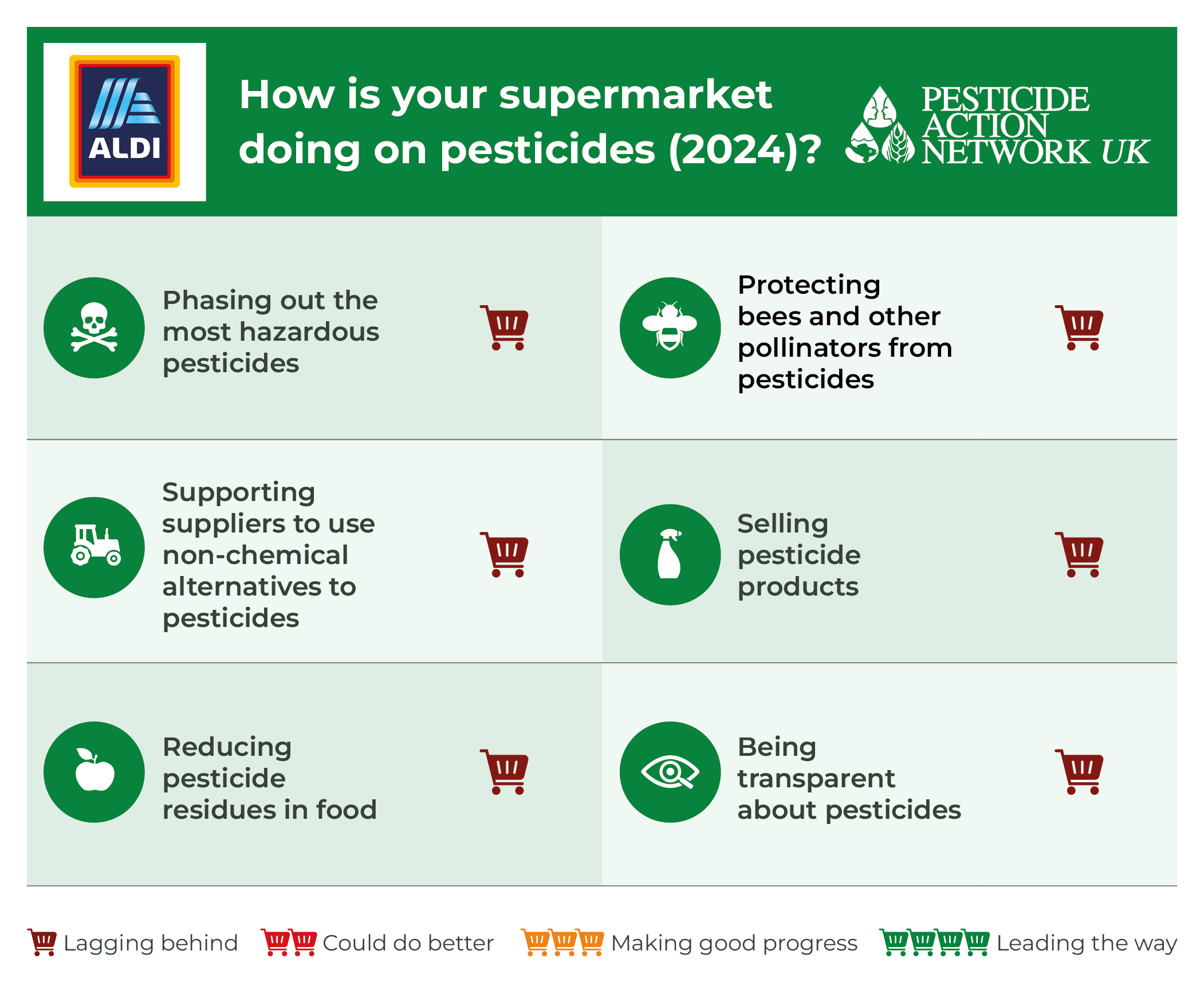Aldi
Aldi received a relatively low overall score and came ninth out of ten supermarkets in the 2024 ranking. The company’s position has not changed since the previous ranking in 2021. While Aldi has made some positive changes in the past three years, it continues to lag behind most other UK supermarkets in terms of protecting the health of consumers, agricultural workers and the environment from pesticides.

What is Aldi doing well?
Phasing out Highly Hazardous Pesticides
- Aldi has a list of specific pesticides which it bans from use within its global supply chains. It also restricts the use of certain pesticides and monitors usage levels of others.
Supporting suppliers to use non-chemical alternatives to pesticides
- Aldi uses third-party sustainable farming schemes which do make some efforts to reduce pesticide-related harms to both the environment and human health. All of Aldi’s UK growers are LEAF Marque certified and their international growers are certified under Global.G.A.P.
Reducing pesticide residues in food
- Aldi tests a range of food types for pesticide residues including fruit, vegetables, herbs, spices,nuts and wheat products such as bread and pasta.
What are Aldi’s priority areas for improvement?
Phasing out Highly Hazardous Pesticides
- Aldi generally only bans or restricts the use of specific pesticides in response to changes in national laws or regulations. The company needs to do far more to end the use of pesticides (including herbicides, insecticides and fungicides) which are particularly harmful to human health or the environment.
Protecting farmworkers from pesticides
- Aldi is not doing enough to protect the health of agricultural workers using pesticides to produce food that ends up on its shelves. Unlike some other supermarkets, the company does not require agricultural workers applying particularly toxic chemicals to adopt additional safety measures. It also doesn’t monitor pesticide poisonings of workers involved in its global supply chains. On health and safety issues related to pesticides, it relies largely on third-party farm assurance scheme GlobalG.A.P and so has far less direct oversight than some other supermarkets.
Supporting suppliers to use non-chemical alternatives to pesticides
- Aldi needs to increase its support to its growers in both the UK and internationally to help them adopt non-chemical alternatives to pesticides. It should follow the example of many other supermarkets by providing training and guidance, establishing groups to bring their growers together for peer-to-peer learning, and funding research and trials into Integrated Pest Management.
Reducing pesticide residues in food
- Aldi only takes action to tackle residues in food when the amount of a pesticide detected reaches its legal safety limit. The majority of other supermarkets take action when their testing detects residues that are less than the legal limit (some as low as 50%) and are therefore more stringent in protecting consumer health.
Protecting bees and other pollinators from pesticides
- Aldi needs to step up its efforts to protect bees and other pollinators, including phasing out the use of neonicotinoids and other highly bee-toxic chemicals throughout its supply chains and supporting its suppliers to monitor and better protect pollinator populations.
- Pesticides are still sprayed around Aldi stores and car parks. To help biodiversity flourish, the company should run trials of non-chemical alternatives with the ultimate aim of phasing out the use of pesticides around its stores as soon as possible.
Selling pesticide products
- Aldi is one of just five of the top ten UK supermarkets still selling pesticides in its gardening range. While the company stopped selling its own-brand pesticides in 2022, it continues to sell pesticides made by other brands and has not reduced its range in the past year. Aldi told PAN UK that it has “…stopped selling pesticides that have the potential to be harmful to bees and pollinators”. However, all synthetic pesticides pose a risk to the environment and are unnecessary for use by amateur gardeners. Aldi should end its sale of all pesticide products as soon as possible.
Being transparent about pesticides
- Aldi should be much more transparent. It should follow the example of other supermarkets by publishing its full pesticide policy and the lists of which pesticides it monitors, restricts or prohibits from its supply chains. The company should also publish three-years’ worth of detailed results from its residue testing programme so that its customers are able to find out which pesticides appear in the food they buy.













